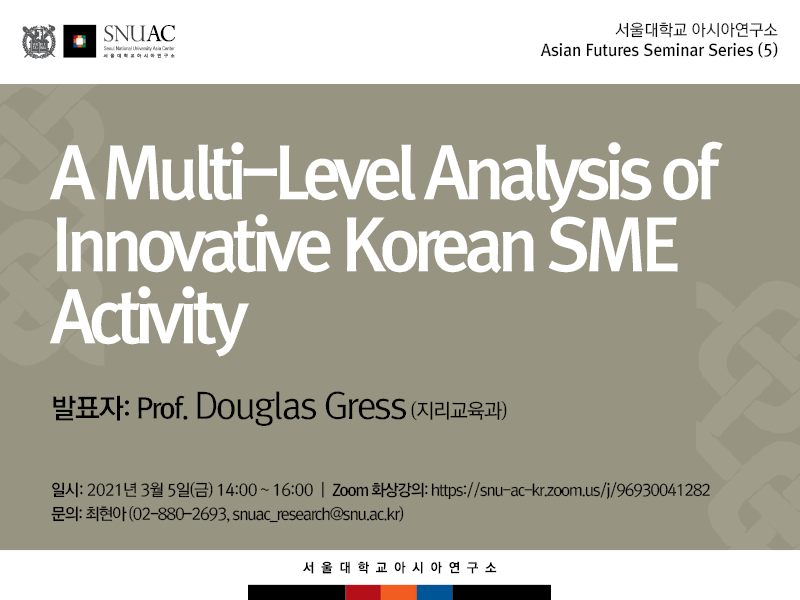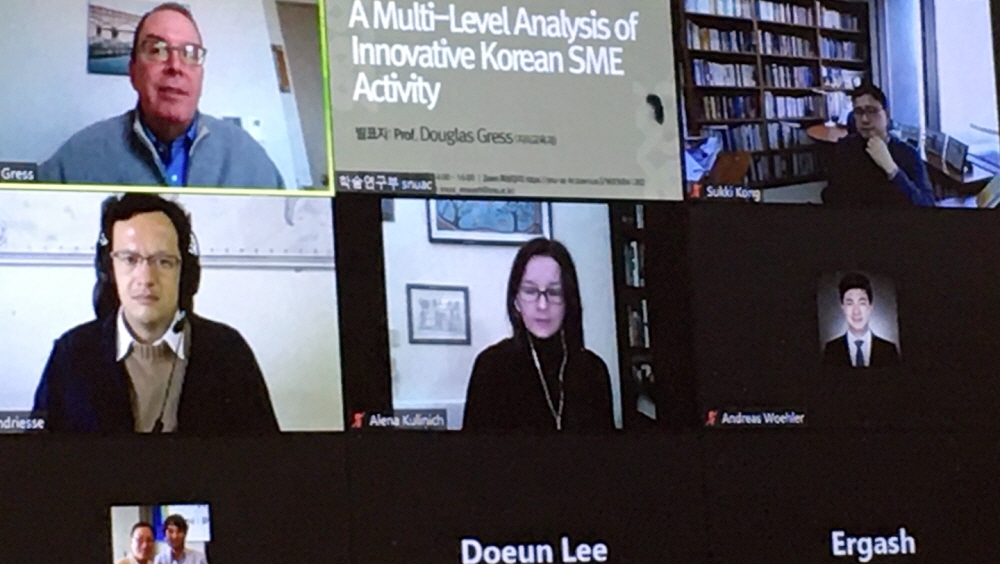
Based on quantitative analyses of data from the 2016 Korean Firm Innovation Survey, the present research examines innovative Korean SME behavior vis-à-vis 1) firm motivations, costs, and purchases; 2) internal R&D and external cooperation and knowledge sourcing; 3) potential complementarities derived from product and process innovation; 4) innovation impacts on domestic and international market positioning and entry; and 5) sources of support for, and impediments to, innovation in order to provide a nuanced understanding of Korea’s innovation ecosystem. The underlying effort is to advance a multi-level approach to the study of innovation by Korean SMEs, an approach that includes analyses of individual, firm, network, and industry-level factors, to include the regulatory environment. Firms engaging in both new and incremental innovation are compared against those engaging in only incremental innovation.
Photo

Review
지난 학기에 시작한 ‘아시아미래 세미나: 외국인교수 특강 시리즈’ 5번째 순서로 서울대 지리교육과 Douglass Gress 교수의 발표와 토론의 시간을 가졌다. 1990년대 초 서울대에 오신 더글라스 교수 경제지리학 전공자로 한국의 중소기업 혁신 활동 및 혁신 생태계의 특징을 2016년 한국 중소기업 혁신 서베이 자료를 토대로 분석하였다. 주요 발표 내용은 아래와 같다.
Based on quantitative analyses of data from the 2016 Korean Firm Innovation Survey, the present research examines innovative Korean SME behavior vis-à-vis 1) firm motivations, costs, and purchases; 2) internal R&D and external cooperation and knowledge sourcing; 3) potential complementarities derived from product and process innovation; 4) innovation impacts on domestic and international market positioning and entry; and 5) sources of support for, and impediments to, innovation in order to provide a nuanced understanding of Korea’s innovation ecosystem. The underlying effort is to advance a multi-level approach to the study of innovation by Korean SMEs, an approach that includes analyses of individual, firm, network, and industry-level factors, to include the regulatory environment. Firms engaging in both new and incremental innovation are compared against those engaging in only incremental innovation.
이번 발표를 통해 더글라스 교수는 중층적 접근의 연구분석틀을 강조하였다. 한국 중소기업의 혁신과정 및 생태계를 분석하기 위해서는 개인수준 (훈련), 기업 수준(지식창출 및 내부 연구개발), 네트워크 수준(협력 및 통합적 생산공정 기술), 그리고 산업수준 (경쟁과 외부 돌발적 충격 그리고 외부 규제환경)별 접근과 통합적 이해가 필요하며 이를 통해 한국 중소기업 혁신 및 생태계의 특징과 한계를 발견하고 이를 극복하기 위한 대안을 찾을 것을 강조하였다. 예컽대, 왜 한국의 중소기업 혁신이 세계적 수준의 경쟁력으로 발전하는데 어려움을 겪고 있는가는 중층적 접근법을 통해 일본 사례와의 비교를 통해 쉽게 발견할 수 있다. 사실 중소기업 혁인 역시 한국적 특수성 즉 국가단위의 추격적 지원과 클러스터 형성 및 지원 전략이 주목되지만, 개인, 기업, 네트워크, 산업 수준별로 그 대안을 발견하는 것이 중요하다.





